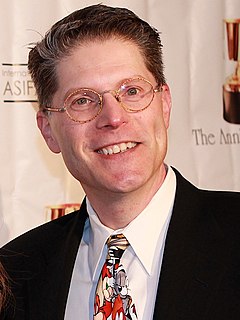A Quote by Jerome Stern
When writers are self-conscious about themselves as writers they often keep a great distance from their characters, sounding as if they were writing encyclopedia entries instead of stories. Their hesitancy about physical and psychological intimacy can be a barrier to vital fiction. Conversely, a narration that makes readers hear the characters' heavy breathing and smell their emotional anguish diminishes distance. Readers feel so close to the characters that, for those magical moments, they become those characters.
Quote Topics
About
Anguish
Barrier
Become
Breathing
Characters
Close
Conscious
Distance
Emotional
Encyclopedia
Feel
Fiction
Great
Hear
Heavy
Instead
Intimacy
Keep
Magical
Magical Moments
Makes
Moments
Narration
Often
Physical
Psychological
Readers
Self
Self-Conscious
Smell
Stories
Themselves
Those
Vital
Were
Writers
Writing
Related Quotes
Mostly the natural landscapes work as a sounding board for my characters, so they can understand themselves, and it acts as a mirror in which we readers see ourselves. The natural world is the place into which all my characters have to situate themselves in order to be who they really are, and that makes my rural fiction feel different from a lot of urban fiction.
I see this with experienced writers, too: They worry so much about the plot that they lose sight of the characters. They lose sight of why they are telling the story. They don't let the characters actually speak. Characters will start to dictate the story in sometimes surprising, emotional, and funny ways. If the writers are not open to those surprises, they're going to strangle the life, spark, or spirit out of their work.
What's actually amazing is that, after a couple of years of living with characters and writing characters and talking about characters, as we sit in the writers room and break episodes, it strikes you, every once in awhile, that you're talking about a character that's played by the same actor, who you've been talking about forever. We talk about a character dying, so you get emotional, and then you realize, "Oh, but wait, that actor is still on the show."
I hear so many writers say - and these are writers that I trust completely - 'I just started hearing a voice', or, 'The characters came to life'. I am filled with loathing for my own characters when I hear that because they do nothing of the sort. Left to their own devices, they do nothing but drink coffee and complain about their lives.
When you start writing, you have your characters on a metaphorical paved road, and as they go down it, all these other roads become available that they can go down. And a lot of writers have roadblocks in front of those roads: they won’t allow their characters to go down those roads... I’ve never put any roadblocks on any of these paths. My characters can go wherever they would naturally go, and I’ll follow them.
I dislike that premise implies that a fiction writer is incapable of dreaming up stories that can bring readers to tears, that if you are lucky enough to be living a pretty sedate life ,as I am, you've got nothing worthy of writing about, that you're incapable of making a reader's gut wrench.Frankly, that's what makes readers nervous, the sorcery of you or me or any good fiction writer making up characters who feel like real people, of telling a story that feels true but isn't.
I think at some level, it's just alchemy that we, as writers, can't explain when we write the characters. I don't set out to create the characters - they're not, to me, collections of quirks that I can put together. I discover the characters, instead. I usually go through a standard set of interview questions with the character in the beginning and ask the vital stuff: What's important to you? What do you love? Hate? Fear? .. and then I know where to start. But the characters just grow on their own, at a certain point. And start surprising me.
One of the things that bugs me about the Western Literary Tradition is that the conventions of narrative in particular seem to confine the stories you can tell about characters to tropes of bone-headed action and old models of psychological realism. And as readers, too, we have been conditioned to understand characters as - and forgive me for saying it out loud - what the market says they should be. Namely, safe, clean, proper.



































